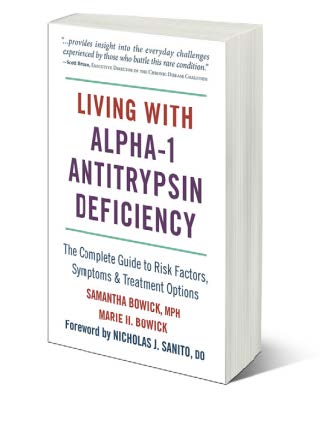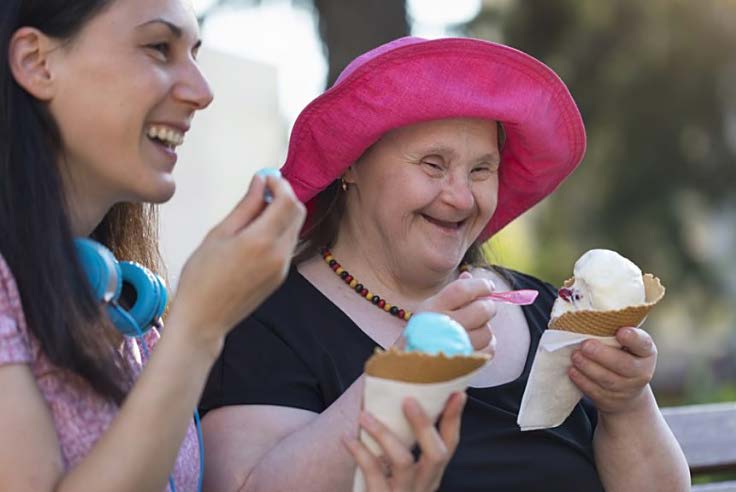LIVING WITH ALPHA-1 ANTITRYPSIN DEFICIENCY: COMPLETE GUIDE TO RISK FACTORS, SYMPTOMS & TREATMENT OPTIONS
"This book outlines the common misconceptions about this condition and the financial hardship it places on patients. Whether you're an Alpha-1 patient, a family member or friend, there is something for everyone within Bowick's work."

- Title: Living with Alpha-1 Antitrypsin Deficiency
- Authors: Samantha Bowick and Marie Bowick
- Publisher: Hatherleigh Press
- Publication Date: August 27, 2019
- Paperback: 96 pages
- ISBN-13: 978-1578268092
- Available at hatherleighpress.com, amazon.com and barnesandnoble.com
Learning to manage the symptoms of alpha-1 antitrypsin deficiency (A1AD) can seem overwhelming. But by taking everything one day at a time and making sure people are provided with the care and support they need, they can still live a life that is fulfilling and meaningful.
Living with Alpha-1 Antitrypsin Deficiency includes information on the latest surgical and non-surgical treatment options, traditional and alternative medical options for a full-body approach to wellness, guidance on self-care techniques for patients and caregivers, and valuable medical and community resources for A1AD sufferers. The book also includes a foreword by pulmonologist Dr. Nicholas J. Sanito.
Scott Bruun, Executive Director of the Chronic Disease Coalition says Living with Alpha-1 Antitrypsin Deficiency "provides insight into the everyday challenges experienced by those who battle this rare condition."
While there is currently no cure for A1AD, patients can take action to reduce their symptoms and improve their overall well-being by practicing proper self-care and following a comprehensive wellness plan. Don't just live with A1AD–live well.
About the Authors: Samantha Bowick has Title: Living with Alpha-1 Antitrypsin Deficiency a Master of Public Health degree from Liberty University. She received a Bachelor of Science degree in Health Care Administration at Columbia Southern University. She is devoted to using her education and experiences to advocate for women who suffer with endometriosis and other chronic illnesses. She is the author of Living with Endometriosis. She currently lives in Aiken, South Carolina.
Marie H. Bowick has lived in Aiken, South Carolina her entire life, and was diagnosed with A1AD at 46 years old. She has been married for 27 years and is the mother of two daughters. She worked in manufacturing for 15 years and then became a caregiver to her mother, f ather, and youngest brother. •
NEW FEDERAL RESEARCH EXAMINES GUARDIANSHIPS OF PEOPLE WITH INTELLECTUAL, DEVELOPMENTAL DISABILITIES
In a recently released report, new federal research examining guardianships of people with intellectual and developmental disabilities (ID/DD) finds data supporting the existence of a "school-to-guardianship pipeline" that results in people with ID/DD being placed under guardianships from their earliest years of majority rather than exploring use of less restrictive decision-making supports.

COLD COMFORT: Individuals with ID/DD are at greater risk of being subject to guardianship than other adults because of widely-held stereotypes about their ability to make decisions and function as adults.
Under guardianship, an individual can have the following rights removed: the right to marry; the right to determine one's own friends; the right to vote; the right to seek or retain employment; the right to consent to a medical procedure, including a sterilization or abortion; the right to drive; the right to decide where to live; and many others.
In its latest report about these and other related findings, the National Council on Disability (NCD) – an independent federal agency that advises Congress, the President, and other federal agencies, found that school officials may be biasing parents toward pursuing guardianships over their adult children with disabilities because of the manner in which they are conveying information – and without understanding the legal implications of guardianship. Schools are the number one referral source for guardianship and a full 58 percent of people with ID/DD ages 18-22 receiving publicly- funded services have guardians, most of whom will remain under guardianships for decades to come – many unnecessarily.
NCD's newest research examines whether the increased risk for people with ID/DD being under guardianships may be linked to the different ways in which states apply their guardianship laws, as well as to assumptions about the abilities of people with ID/DD to fully experience the dignity of risk. The research goes on to examine how being under a guardianship impacts one's ability to benefit from key civil rights laws.
NCD's report, which relied heavily on key informant interviews and analysis of applicable existing data sets, also provides an in-depth analysis of the experience of people with ID/DD under guardianships in Washington, D.C., before and after recent guardianship reforms.
The report concludes by offering policy recommendations to states, the Social Security Administration, the U.S. Department of Education, the U.S. Department of Justice, the U.S. Department of Health and Human Services, and state courts.
Among the recommendations, NCD calls on DOJ to issue guidance to states on their legal obligations under the ADA in the context of ensuring that guardianship be a last resort imposed only after less-restrictive alternatives have been determined to be inappropriate or ineffective; and calls on ED to do more to promote its existing guidance that recognizes the serious implications of guardianship and encourages schools to recognize less restrictive decision making supports for adults in special education.Read the report at ncd.gov/publications/2019/turning-rights-into-reality.
ABOUT THE NATIONAL COUNCIL ON DISABILITY
First established as an advisory Council within the Department of Education in 1978, NCD became an independent federal agency in 1984. In 1986, NCD recommended enactment of an Americans with Disabilities Act (ADA), and drafted the first version of the bill which was introduced in the House and Senate in 1988. Since enactment of the ADA in 1990, NCD has continued to play a leading role in crafting disability policy, and advising the President, Congress and other federal agencies on disability policies, programs, and practices.
AAIDD OPPOSES A PROPOSED REVISION TO THE DSM-5's ENTRY FOR INTELLECTUAL DISABILITY
The American Association on Intellectual and Developmental Disabilities, in late July, submitted comments to the American Psychiatric Association strongly opposing a proposed change to the DSM-5 concerning the diagnostic criteria for intellectual disability.
AIDD is the oldest inter-disciplinary professional society with a focus on intellectual disability in the world. Since its inception, AAIDD has produced guidelines naming, defining, and diagnosing the condition known today as "intellectual disability." In 1910, AAIDD published the first scholarly international terminology and classification system for ID (today the AAIDD manual is in its 11th edition). The AAIDD manual has been revised as the science and understanding of the condition has evolved over time; its approach and evolving understanding of the condition have been shared by other major diagnostic systems, including the DSM and ICD. On September 7, 2018, AAIDD proposed that the following sentence be deleted from the DSM-5's diagnostic criteria for ID:
"To meet diagnostic criteria for intellectual disability, the deficits in A adaptive functioning must be directly related to the intellectual impairments described in Criterion A."
The rationale for this modest proposal was that the current text appeared to add a new, fourth criterion to the diagnostic criteria, one that required the deficits in adaptive functioning be "directly related to" (commonly understood to mean "caused by") the deficits in intellectual functioning, a criterion which is neither possible for clinicians to ascertain nor empirically supported. In its proposal, AAIDD also noted that problems created by this phrase were not merely a theoretical concern, but that the practical impact of this change to the diagnostic criteria could easily be foreseen in matters as diverse as eligibility for supports and services, educational placement and assistance, protection from discrimination, funding for ongoing services and supports, and various legal issues in the criminal and civil justice systems.
On July 8, 2019 APA offered a proposed revision, open for public comment, to address the issues raised by AAIDD; however, AAIDD strongly opposes the current proposed revision as it:
- • Is not supported by empirical evidence (there is no empirical evidence supporting the notion of a causal link between intellectual functioning and adaptive behavior);
- • Incorrectly assumes that adaptive functioning and intellectual functioning are not separate and independent constructs;
- • Plainly requires clinicians to establish that the deficits in adaptive functioning are "a consequence of" intellectual deficits, which is impossible for clinicians to scientifically or clinically establish;
- • conceptual confusion by conflating etiology with diagnostic criteria,
- • Mistakenly asserts causation that puts a primacy in diagnosis on IQ and creates internal inconsistency in the criteria by anchoring both clinical elements of the diagnosis in IQ;
- • Creates diagnostic error by creating a fourth diagnostic criterion; and
- • Represents a significant and dramatic departure from previous DSM manuals, contradicts current clinical and scientific consensus, and is out of step with other diagnostic systems (i.e., the World Health Organization's ICD and AAIDD) that define the same condition.
The proposed revision and comment portal are available at psychiatry.org/psychiatrists/practice/dsm/proposed-changes. The proposed revision is open to public comment and the comment period ends August 14, 2019.
SPECIAL NEEDS GROUP/SPECIAL NEEDS AT SEA DONATES BACKPACKS TO MORE THAN 175 STUDENTS
Special Needs Group® /Special Needs at Sea,® a leading global provider of wheelchair rentals, scooter rentals, oxygen rentals and other special needs equipment rentals, donated backpacks to more than 175 Broward County Public School students attending the July 27 Dania Beach Lions Club-sponsored Back-to-School Shopping Spree at the Walmart in Davie, Florida.

READY-TO-GO-BACK PACK: Special Needs Group donated backpacks at the Dania Beach Lions Club's Back to School Shopping Spree hosted by Walmart. To prepare for the upcoming school year, students picked out school supplies, uniforms and other necessities.
School guidance counselors recommended students for participation. Qualified students were given a $50 budget and paired up with volunteers to shop at Walmart. Students picked out school supplies, uniforms and other necessities to prepare for the upcoming school year. After shopping, students were encouraged to express gratitude and appreciation to their volunteer helper. They also were asked to "pay it forward" by doing something nice for someone else.
"While SNG has a mission to deliver an accessible world through special needs equipment, we also place great importance on supporting the local community – especially education," said Andrew J. Garnett, founder, president & CEO of SNG. "We want to be a part of ensuring that Broward Countystudents have all of the tools they need for a successful school year.
"Knowledge is something that students can carry with them wherever they go and travel in life, and we want to help provide them with the best opportunity to gain that knowledge," he continued.
Special Needs Group® / Special Needs at Sea® is a leading global provider of wheelchair rentals, scooter rentals, oxygen rentals and other special needs equipment rentals. It also offers a broad range of special needs equipment for purchase. Recommended by the world's major cruise lines for superior service and value, Special Needs Group also services guests visiting hotels, resorts, theme parks and convention centers. Special Needs Group provides service in 215 ports and cities located in 68 countries. It is located at 302 NW 1st Street, Dania Beach, FL 33004. For more information, visit specialneedsgroup.com.
The Dania Beach Lions Club was formed in 1947 supporting the core mission of Lions Club International with the motto "We Serve." While vision is our primary focus by providing screenings, collecting glasses and raising awareness of eye disease, other projects include protecting the environment, feeding the hungry and caring for people with special needs.•